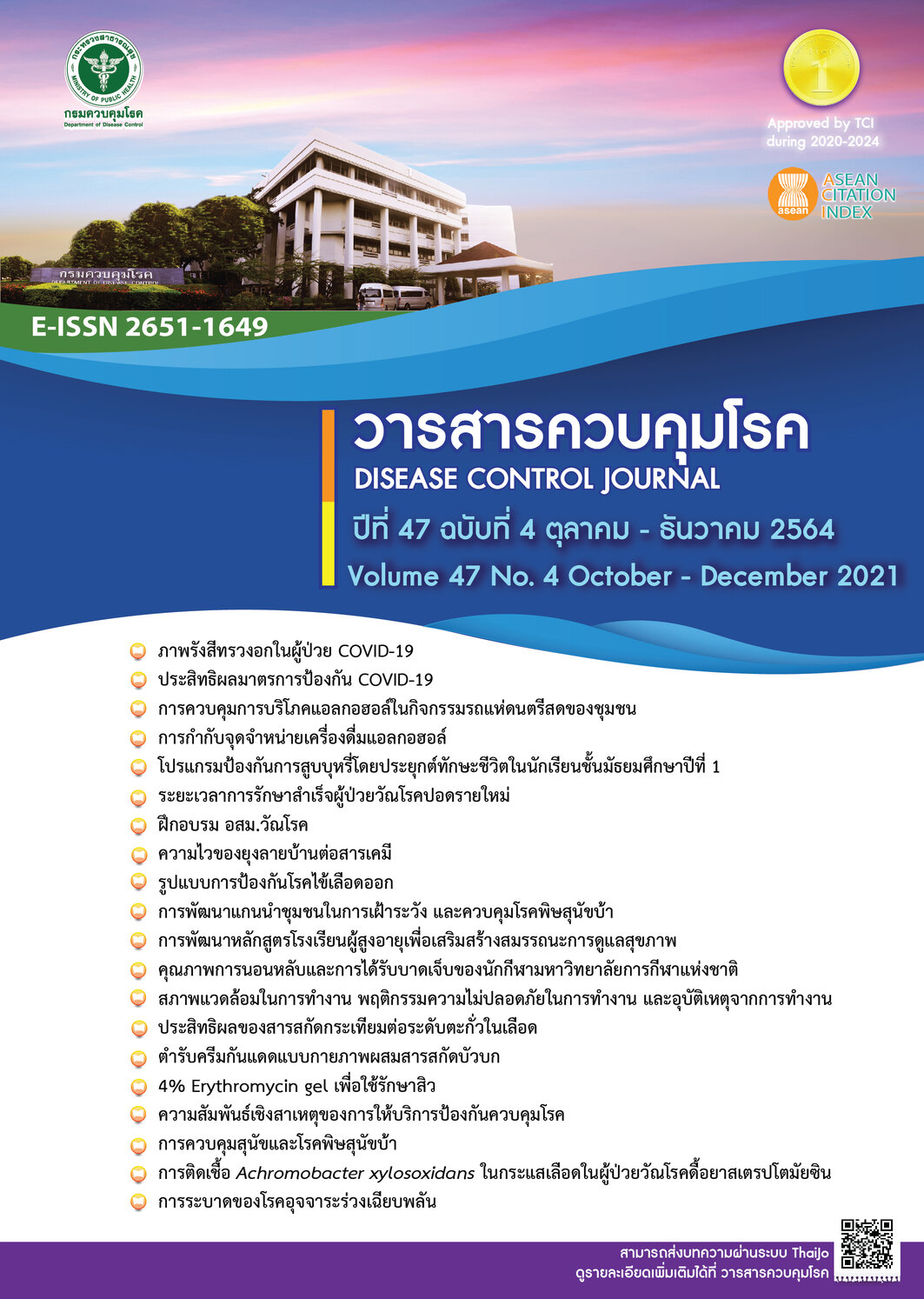The development of a training course for Health Volunteers to be competent in Tuberculosis
DOI:
https://doi.org/10.14456/dcj.2021.83Keywords:
curriculum development, tuberculosis, village health volunteersAbstract
The purposes of the research were to develop a training course for the tuberculosis expert health volunteers and evaluate the effectiveness of the curriculum. There are four steps of the research and the curriculum development as follows: the study and analysis of the basic data; the curriculum design and development; trial of the course; assessments and course Improvement. The sample group for the study was undertaken by means of purposive sampling. There were 30 health volunteers. The one-group pretest-posttest design was used to compare the differences between the average scores on the knowledge of tuberculosis, pre- and post of training. The attitude towards training course was measure. Statistics used in data analysis were percentage, mean, standard deviation and dependent samples t-test. Based on the findings of the study, it was concluded that: the training course and its curriculum was successful at the high degree. The curriculum was appropriate to be adopted in the actual situation in the real life; The knowledge score before and after of the training had a statistically significant increased. The result of the assessment the attitude towards the developed training curriculum was at the high level. This course is therefore suitable to train public health volunteers to have competent in screening and finding new patients to providing continuous care of tuberculosis patients at home. This will help alleviate the workload of health personnel to a certain extent. It will also help shorten the cycle of tuberculosis transmission in the community soon. This will benefit tuberculosis control and make the strategic plan goals a reality.
Downloads
References
Division of Tuberculosis (TH), Department of Disease Control. National Action Plan Against Tuberculosis 2017-2021, 1st ed. Nonthaburi: Division of Tuberculosis (TH); 2017. (in Thai)
Sichiangmai Hospital (TH). Summary Report of Tuberculosis Control Performance Annual budget year 2019. Nongkhai: Sichiangmai Hospital (TH); 2019. (in Thai)
Department of Health Service Support (TH). A Guide to New generation Health Volunteers. Nonthaburi: Agricultural Cooperative Assembly of Thailand; 2011. (in Thai)
Sangad U. Techniques in managing teaching and learning systematically. Bangkok: Department of Administration education, Chulalongkorn Uni¬versity; 1989. (in Thai)
Taba H. Curriculum development theory and practice. New York: Harcourt, Brace & World; 1962.
Chancharee K. The Development of Leadership Training Program [thesis]. Bangkok: Ramkham¬haeng University; 2012. (in Thai)
Flippo E. Principle of Personal Management. New York: McGraw-Hill; 1996.
Feenstra C. Community based and community focused: Nursing education in community health. Public Health Nurse. 2000;17(3):155-9.
Prapas A, Charunyu T. The effect of potential development of a village health volunteer Network on a visit to Khwao Subdistrict, Sela¬phum District, Roi Et Province, 2012. Journal of The Office of DPC 7 Khon kaen. 2013;20:1- 8. (in Thai)
Choodech R. The Development of Health Volunteers’ Competency for Tuberculosis Screeningin Communityin Nam Pat District, Uttaradit Province. Journal of Disease Prevention and Control: DPC.2 Phitsanulok. 2019;6:48. (in Thai)
Chuchai S. Personnel Training in Organization. 7th ed. Bangkok: Chulalongkorn University; 2011. (in Thai)
Chom P. Teaching and learning psychology. Bangkok: Thai Wattana; 2003. (in Thai)
Dilok T. An Analysis of Factors Affecting Job Performance of Public Health Volunteers Suphan Buri Province [thesis]. Bangkok: Mahidol Uni¬versity; 2008. (in Thai)
Yutthana Y. Factors Affecting the Standard of Primary Health Care Performance among Village Health Volunteers in Sukhothai Province. Nurs¬ing Public Health and Education Journal. 2018;9(3):145. (in Thai)
Downloads
Published
How to Cite
Issue
Section
License
Articles published in the Disease Control Journal are considered as academic work, research or analysis of the personal opinion of the authors, not the opinion of the Thailand Department of Disease Control or editorial team. The authors must be responsible for their articles.






